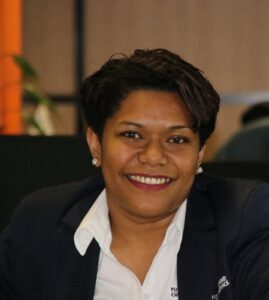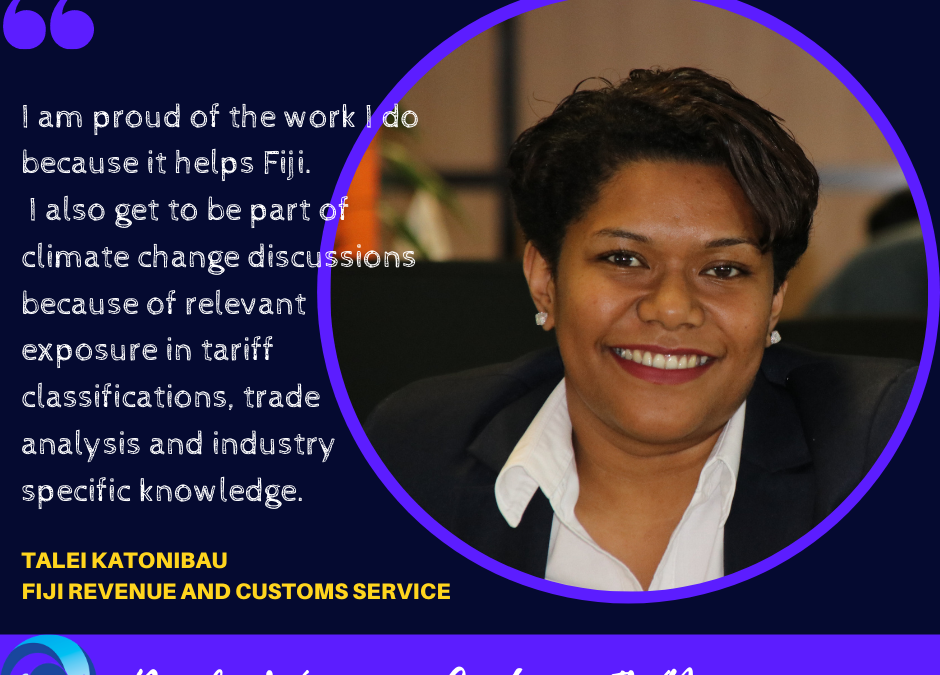 Suva, Fiji, 17 March, 2021 – Talei Katonibau is a Customs Officer in the Tariff and Trade Section of the Fiji Revenue and Customs Service, a position she has held for six years. The Tariff and Trade Section is responsible for the administration of duty concessions, import licenses and providing advice on import restrictions and Customs Regulations to internal and external stakeholders. Sounds mundane but the section is one of the most important in FRCS in terms of facilitating trade and revenue collection.
Suva, Fiji, 17 March, 2021 – Talei Katonibau is a Customs Officer in the Tariff and Trade Section of the Fiji Revenue and Customs Service, a position she has held for six years. The Tariff and Trade Section is responsible for the administration of duty concessions, import licenses and providing advice on import restrictions and Customs Regulations to internal and external stakeholders. Sounds mundane but the section is one of the most important in FRCS in terms of facilitating trade and revenue collection.
What are your current responsibilities?
We prepare assessments of relevant regulations, analyze trade data and make recommendations for relevant decision making. We are basically problem solvers. We analyze the request and assess the relevant legislations that will best resolve the matter and make appropriate recommendations. We also support the Policy Team in National Budget preparations for FRCS. Being one of only 2 female Customs officials participating in the 2020/2021 Fiji National Budget Announcement core discussions which saw major reforms in more than 1900 tariff lines was a memorable experience. The exercise was strenuous, but we had to deliver efficiently and within strict timelines. Expectations were high as we were required to properly classify goods and interpret tariff descriptions to government officials for crucial decision making.
Additional responsibilities
As the contact person of the LTA/FRCS MOU I correspond almost daily with LTA (Land Transport Authority) to discuss inter-agency issues on motor vehicles and machinery and ensure that our agency’s interests are protected in terms of import compliance, standards compliance and vehicle registrations. The LTA/FRCS Working Group discussions has helped make regulation changes to motor vehicle imports and achieve alignment of locally enforced restrictions by LTA with the import restrictions of FRCS.
I am also representing FRCS in various national environmental working groups such as the Agreement for Climate Change and Trade Sustainability – ACCTS negotiations for the environment goods and fossil fuel subsidies pillars and the National Polystyrene Ban Committee. My favorite project at the moment is the ACCTS negotiations as it is now a major ongoing discussion that will see trade liberalization of goods that have relevance to mitigating climate change. With Fiji being the only Pacific small island developing state in the negotiations this puts greater pressure on ensuring that our interests are represented in the discussions.
What is the biggest challenge you have overcome in your work?
One of the biggest challenges is working outside the scope of what I studied in University. I first started under the Customs Graduate Trainee Program in 2015 after graduating from the University of the South Pacific with Bachelor of Commerce in Economics and Accounting. While I had expected to be engaged in work that was more suited for my background , there were bigger plans put in place for me in Tariff and Trade. There may have been a bit of self-doubt and fear when first starting because I was limiting my own potential.
How did it feel to overcome this challenge?
It has been rewarding. I am proud of the work I do because it helps the Nation. Our team has been crucial in policy formulation and implementation for Customs in Fiji. I also get to be part of climate change discussions because of relevant exposure in tariff classifications, trade analysis and industry specific knowledge. I would not have had these opportunities without my team and the mentoring of my various managers who trusted me provided constant guidance throughout my career.
How has these experiences at work helped you in your life?
Overcoming the challenges has given me the confidence to take on more challenging tasks outside the scope of what I think I am capable of. I have learnt to have more confidence in myself and not undermine myself. I have carried that mindset in all the aspects of my life and tried to have a positive outlook when faced with challenges.
How has your work changed under COVID-19?
We have had to change our perspective in terms of policy designing to cater to the situation at hand. Being mindful of the potential threats and how to mitigate it is constantly in our mind as we prepare for the upcoming National Budget Announcement.
Click Here for French Translation
ENDS
For more information or for any queries, please contact the Secretariat or email: mediaoco@ocosec.org
Our Gender Program: In 2019, the OCO held its inaugural Change Management on Gender Equality workshop, which suggested there should be gender equality on all aspects of OCO’s work program. This suggestion was endorsed at the 2020 OCO Annual Conference. In 2020, OCO member countries were encouraged to celebrate the International Women’s Day in their own administrations and to share their activities widely. This year, OCO is dedicating the month of March to our women. The Pacific Women in Customs Series is a collection of stories of women who are working in Customs in their various countries and we hope to inspire more women to join this field of work.
